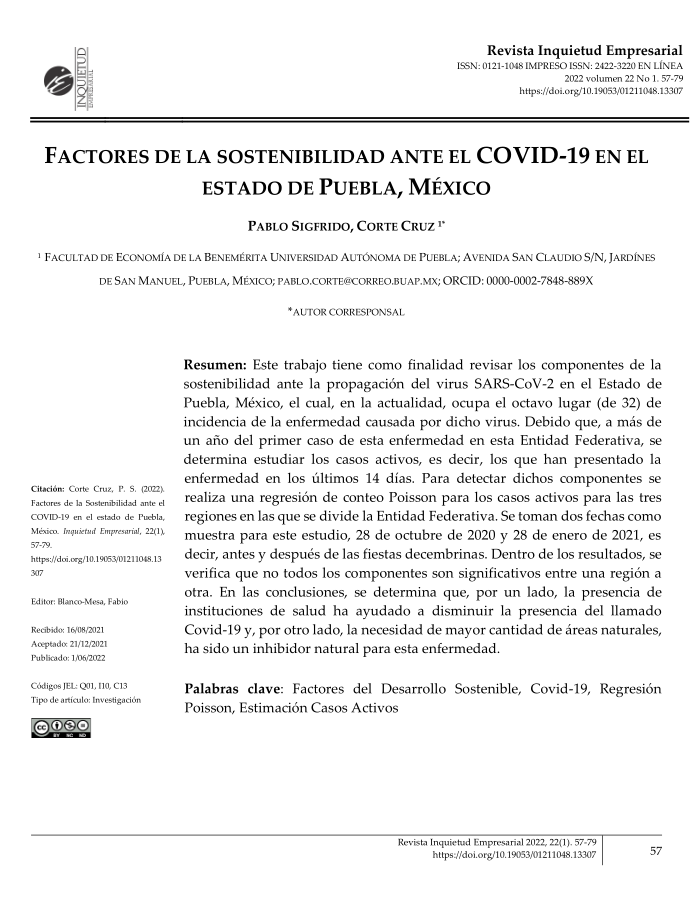Sustainability Factors in the Face of COVID-19 in the State of Puebla, Mexico

Abstract
This document aims to review the components of sustainability in the face of the spread of the SARS-CoV-2 virus in the State of Puebla, Mexico, which, currently, occupies the eighth place (out of 32) of incidence of the disease caused by this virus. Since more than a year after the first case of this disease in this federal entity, it is determined to study the active cases, that is, those that have presented the disease in the last 14 days. To detect these components, a Poisson count regression is performed for the active cases for the three regions into which the federative entity is divided. Two dates are taken as a sample for this study, October 28, 2020, and January 28, 2021, i.e., before and after the December holidays. Within the results, it is verified that not all the components are significant from one region to another. It is concluded, on the one hand, that the presence of health institutions has helped to reduce the spread of the COVID-19 and, on the other hand, the need for more natural areas has been a natural inhibitor for this sickness.
JEL Codes: Q01, I10, C13
Received: 16/02/2021. Accepted: 21/12/2021. Published: 01/06/2022.
Keywords
sustainable development factors, COVID-19, Poisson regression, active cases estimation
References
- Bloom, D., Cadarette, D. & Sevilla, J. (2018). Las enfermedades infecciosas nuevas y recurrentes pueden tener amplias repercusiones económicas. Finanzas & Desarrollo, 55(2), 46-49.
- Bordieu, P. (2011). Las estrategias de la reproducción social. Siglo XXI.
- Cálix, A. (2020, abril,). La conciencia del límite. Capitalismo, sustentabilidad y coronavirus. Nueva Sociedad. https://nuso.org/articulo/la-conciencia-del-limite/
- Cámara de Diputados. (2015). Anuario estadístico y geográfico de Puebla, 2015. http://www.diputados.gob.mx/sedia/biblio/usieg/usieg_anu_est16/Puebla/Agricultura.xls
- Cárdenas, M. (2020). COVID-19: la lucha invisible contra la ignorancia y el estigma. Index de Enfermería, 29(1-2), 67-68.
- Coneval. (s.f.a). Índice de rezago social 2000-2015. https://www.coneval.org.mx/Medicion/IRS/Paginas/Indice_Rezago_Social_2015.aspx
- Coneval. (s.f.b). Medición de la pobreza 2018. https://www.coneval.org.mx/Medicion/Paginas/Tablas-dinamicas-municipales.aspx
- Corte, P. & Carrillo, M. (2020). La sostenibilidad en municipios rurales del estado de Puebla ante el Covid-19. En M. Carrillo, O. Vázquez y S. Flores (coords.), La pandemia por Covid-19 y su impacto multidimensional. Una visión crítica (pp. 131-152). Montiel & Soriano Editores.
- Delgado, G. (2020, 27 de jul.). Covid-19 y sustentabilidad urbana. Revista Nexos. https://medioambiente.nexos.com.mx/covid-19-y-sustentabilidad-urbana/
- Díaz, E. (2020, 12 de mayo). Efectos económicos del coronavirus Covid-19 en la economía de México. Estudios del Colef. Colegio de la Frontera. https://www.colef.mx/estudiosdeelcolef/efectos-economicos-del-coronavirus-covid-19-en-la-economia-de-mexico/
- Farkas, K., Hillary, L.S., Thorpe, J., Walker, D.I., Lowther, J.A., McDonald, J.E., Malham, S.K., & Jones, D.L. (2021). Concentration and Quantification of SARS-CoV-2 RNA in Wastewater Using Polyethylene Glycol-based Concentration and qRT-PCR. Methods Protocols, 4(17), 1-9. https://doi.org/10.3390/mps4010017
- Fedele, J. (2020). Territorio y pandemia. ARQUISUR Revista, 10(17), 114-127. https://doi.org/10.14409/ar.v10i17.9132
- Hill, R. C., Griffiths, W. E., & Lim, G. C. (2018). Principles of Econometrics. John Wiley & Sons Inc.
- IEE. (s.f.). Estadísticas de los resultados electorales. Instituto Estatal Electoral del Estado de Puebla. https://www.ieepuebla.org.mx/index.php?Categoria=memorias
- INEGI. (2017). Anuario estadístico y geográfico de Puebla 2017. Gobierno de México. https://www.datatur.sectur.gob.mx/ITxEF_Docs/PUE_ANUARIO_PDF.pdf
- INEGI. (2020). Sistema para la consulta de información censal. https://censo2020.mx/actualizacion-de-los-sistemas-de-consulta.html
- Luna, J. (2020a). Sustentabilidad y Covid-19: retos para la investigación en la era pospandémica. Ecocience International Journal, 2(3), 5-13. https://doi.org/10.35766/je20231
- Luna, J. (2020b). Determinaciones socioambientales del Covid-19 y vulnerabilidad económica, espacial y sanitario-institucional. Revista de Ciencias Sociales, 26(2), 21-26. https://doi.org/10.31876/rcs.v26i2.32419
- Machado, A., & Richter, M. (2020). Sustentabilidade em tempos de pandemia (Covid-19). RECIMA21, Revista Científica Multidisciplinar, 1(2), 264-279. https://doi.org/10.47820/recima21.v1i2.25
- Massieu, Y. (2021, 4 de marzo). Vacunas anti Covid 19: ciencia, economía y política. La Jornada de Oriente. https://www.lajornadadeoriente.com.mx/puebla/vacunas-anti-covid-ciencia/
- Mesa, V., Franco, O., Gómez, C., & Abel, T. (2020). Covid-19: The Forgotten Priorities of the Pandemic. Maturitas, 136, 38-41. https://doi.org/10.1016/j.maturitas.2020.04.004
- Nicolletti, M., Alem, G., Blazek, M., Fillippi, P., & Bismarchi, L. (2020). Atuação empresarial para sustentabilidade e resiliência no contexto da Covid-19. Revista de Administração de Empresas, 60(6), 413-425. http://dx.doi.org/10.1590/S0034-759020200605
- Nieves, V. (2020, 7 de abril). La gripe española de 1918 o por qué actuar rápido es vital para la economía y la salud. El Economista. https:// www.eleconomista.es/economia/noticias/10466267/04/20/La-gripe-espanola-de-1918-o-por-que-actuarrapido-es-vital-para-la-economia-y-la-salud.html
- OMS. (2021). Coronavirus (Covid-19) Dashboard. https://covid19.who.int/
- Reyes, J. (2020, 20 de oct.). ¿Un futuro sustentable para México tras el covid-19?. Excelsior. https://www.excelsior.com.mx/opinion/opinion-del-experto-nacional/un-futuro-sustentable-para-mexico-tras-el-covid-19/1412583
- Sandoval, Y., Torres, P. & Corte, P. (2018). Minería al aire libre y deterioro de sistemas socioecológicos rurales. Un estudio de caso en
- Tetela de Ocampo, Puebla, 2012-2016. En E. Pérez y V. Mota (coords.), Impacto socioambiental, territorios sostenibles y desarrollo regional desde el turismo (pp. 387-406). AMECIDER-UNAM.
- Secretaría de Cultura. (2018). Sistema de información cultural. https://sic.cultura.gob.mx/
- Secretaría de Salud. (2021). Covid-19. Datos abiertos. https://covid19.sinave.gob.mx/
- Secretaría de Salud del Estado de Puebla. (s.f.). Directorio de hospitales y centros de salud. http://ss.puebla.gob.mx/servicios/directorio-hospitales-y-c-de-salud
- Secretaría de Salud del Estado de Puebla. (2020). Covid-19: reporte 28 de octubre. http://ss.puebla.gob.mx/covid-19/item/1237-reporte-28-de-octubre
- Secretaría de Salud del Estado de Puebla. (2021). Covid-19: reporte 28 de enero. http://ss.puebla.gob.mx/covid-19/item/1435-reporte-28-de-enero
- Semarnat. (2020). La pandemia por el Covid-19 abre la oportunidad a México de transitar a ciudades sustentables mediante políticas integrales. Gobierno de México. https://www.gob.mx/semarnat/prensa/la-pandemia-por-el-covid-19-abre-la-oportunidad-a-mexico-de-transitar-a-ciudades-sustentables-mediante-politicas-integrales
- Wooldrige, J. (2012). Introductory Econometrics. A Modern Approach. South Western Cengage Learning.
- WWL. (2020, 22 de jul.). Cómo el Covid-19 representa un reto para la sostenibilidad. https://www.worldwildlife.org/descubre-wwf/historias/como-el-covid-19-representa-un-reto-para-la-sostenibilidad#:~:text=Los%20impactos%20ambientales%20del%20COVID,nuevo%20por%20la%20vida%20silvestre
